How Undergraduates Benefit From Doing Research
Undergraduate research isn't just for STEM subjects.

Benefits of Undergraduate Research

Getty Images
Studies show students who participate in research earn better grades, are more likely to graduate and are better equipped for graduate school or careers.
Jessica Stewart understands from personal experience the value of doing research as a college undergraduate. In her junior year at the University of California, Berkeley , Stewart worked with art historian Darcy Grimaldo Grigsby on her book, "Colossal," researching the Suez Canal, Eiffel Tower and other massive art and engineering monuments.
She loved the research so much that she went on to get her Ph.D. in art history. Almost 20 years after working on "Colossal," Stewart now directs the program that gave her the opportunity: UC Berkeley’s Undergraduate Research Apprenticeship Program.
But the initial benefit of doing undergraduate research was even more practical. When she was deciding which projects to apply for as an undergraduate, she got to explore many academic disciplines. This process opened her eyes.
“From the moment I set foot on campus, URAP allowed me to see what kinds of ideas I could study,” Stewart says. “The research and credit are great, but there’s this wayfinding side, too, where students can learn who researchers are, what research looks like and fields they may not have had any exposure to.”
A long tradition at some universities, mentored research projects are now offered at undergraduate institutions around the U.S. While many programs started out focused on science, today most universities offer opportunities across disciplines, including all aspects of STEM as well as architecture, business and theater arts.
No matter the subject area, research participation is an asset for undergrads. Studies show students who participate earn better grades , are more likely to graduate and are better equipped for graduate school or careers.
“It’s often most transformative for nontraditional learners and underrepresented students,” Stewart says. “They learn to triangulate life experience and studies in ways that may not have been intuitive for them. It greatly improves academic performance, retention and persistence.”

Research Roots in STEM
Every year, 6,000 undergraduates participate in research experiences through the National Science Foundation, mostly during the summer. Projects span nearly 20 subject areas , such as astronomy and ocean sciences. Most take place in the U.S., but some research is done abroad, including a marine sciences project at the Bermuda Institute of Ocean Sciences.
Experiences like these increase students’ confidence in their research skills and boost awareness of what graduate school will be like, according to a 2018 study . They also help students identify whether they want to pursue a science career.
“It’s one of the best ways to recruit students into STEM careers and retain them,” says Corby Hovis, a program director at the NSF's Division of Undergraduate Education. “That’s why we do it. It’s an effective way to get students from classrooms into doing STEM.”
The NSF is especially interested in applications from students who might not have had past opportunities to do research, including those who are the first in their families to attend college, and Black and Latino students.
Research institutions apply for NSF grants to mentor undergraduate students and guide them through participation in an ongoing project. For students, the experience includes orientation and training, as well as a stipend and allowances for housing and travel. In most cases, students write a paper about their contribution to research and may even present at a conference or seminar.
Some opportunities require that students have specific math courses under their belts, but all focus on helping students build other skills, aside from lab or research techniques, that they’ll need for future academic work or careers.
“Communicating clearly the results of research is a skill that could carry over into any field,” Hovis says. “The teamwork and cohort experience not only encourages them to continue in science, but (is) translatable to any number of other activities they will do later on.”
Connecting With Faculty
At the Massachusetts Institute of Technology , research has been part of the undergraduate experience for more than 50 years. Some students choose the school specifically for this reason, and more than 90% of students participate. As at other schools, research is part of a bigger initiative around experiential learning, which also includes service learning and study abroad .
The biggest challenge for students is usually figuring out what kind of research they’re interested in.
“We depend on students to do some of that footwork,” says Michael Bergren, director of MIT's Undergraduate Research Opportunities Program. “There are a lot of supports, but at the end of the day a student needs to understand what they’re interested in, who's doing the work they’re interested in and what the steps are to participating in that research.”
But there is hand-holding, if needed. Before applying to work on a project, students have to approach the lead faculty member and introduce themselves.
“This is really intimidating. We don’t take that for granted,” Bergren says. “Part of life skills development is approaching a lab or faculty member and advocating for themselves.”
Peers offer tips about how to navigate that face-to-face encounter, such as find out a faculty member's office hours, send an email with a resume attached and attend a departmental event.
The networking doesn’t stop there. Get to know which graduate students work on the project, talk to other students who might be exploring the same opportunities and make sure you know what the work involves.
“As the research progresses, deliverables amp up,” Bergren says. “You may find you need to put more time into this right when finals are happening.”
The Future of Undergraduate Research
Some undergraduate researchers might share their work at academic conferences or seminars, or even be published in journals. Some might participate in the Council on Undergraduate Research annual conference , the largest symposium of its kind. Every year, more than 4,000 students attend a graduate school and career fair and present work that spans the disciplines.
Students have come to expect that they’ll get a chance to do research as undergrads, says Lindsay Currie, the council's director.
“More recent generations grew up in a different climate. They learned by doing in classrooms,” Currie says. “That, combined with a workforce that expects people to have lived experience, means students want to be able to say that they’ve already done research as part of their coursework.”
What’s next, Currie says, is universities that integrate research into coursework so that students start a project their first year and continue through their time in college. Working with a network of universities, the Council on Undergraduate Research has completed a study of how schools can modify their curricula to incorporate research from the very beginning.
“Starting as freshmen, students would work on research that would build,” Currie says. “This would be significantly more advanced projects that would be consistent across the particular department. This is how they’re going to teach, because they know students benefit from doing.”
Tips to Make Your Final College Choice

2025 Best Colleges

Search for your perfect fit with the U.S. News rankings of colleges and universities.
College Admissions: Get a Step Ahead!
Sign up to receive the latest updates from U.S. News & World Report and our trusted partners and sponsors. By clicking submit, you are agreeing to our Terms and Conditions & Privacy Policy .
Ask an Alum: Making the Most Out of College
You May Also Like
Avoid money problems in med school.
Sammy Allen Nov. 15, 2024

Seek Mentors at U.S. Colleges
Anayat Durrani Nov. 13, 2024

10 HBCUs With Low Acceptance Rates
Cole Claybourn Nov. 13, 2024

Applying to College as Undecided Major
Anthony Todd Carlisle Nov. 11, 2024

How to Make a College List
Cole Claybourn Nov. 6, 2024

Weighing LSAT Test Prep Options
Gabriel Kuris Nov. 4, 2024


Data Privacy Tips for College Students
Cole Claybourn Nov. 4, 2024

Preparing for Your First Job Post-Grad
Sarah Wood Oct. 31, 2024

5 Ways to Decrease Medical School Costs
Anayat Durrani Oct. 31, 2024

Graduate School with Student Loan Debt
A.R. Cabral Oct. 31, 2024

5 Reasons Why Undergraduates Should Do Research
- by Julia Ann Easley
- May 02, 2017
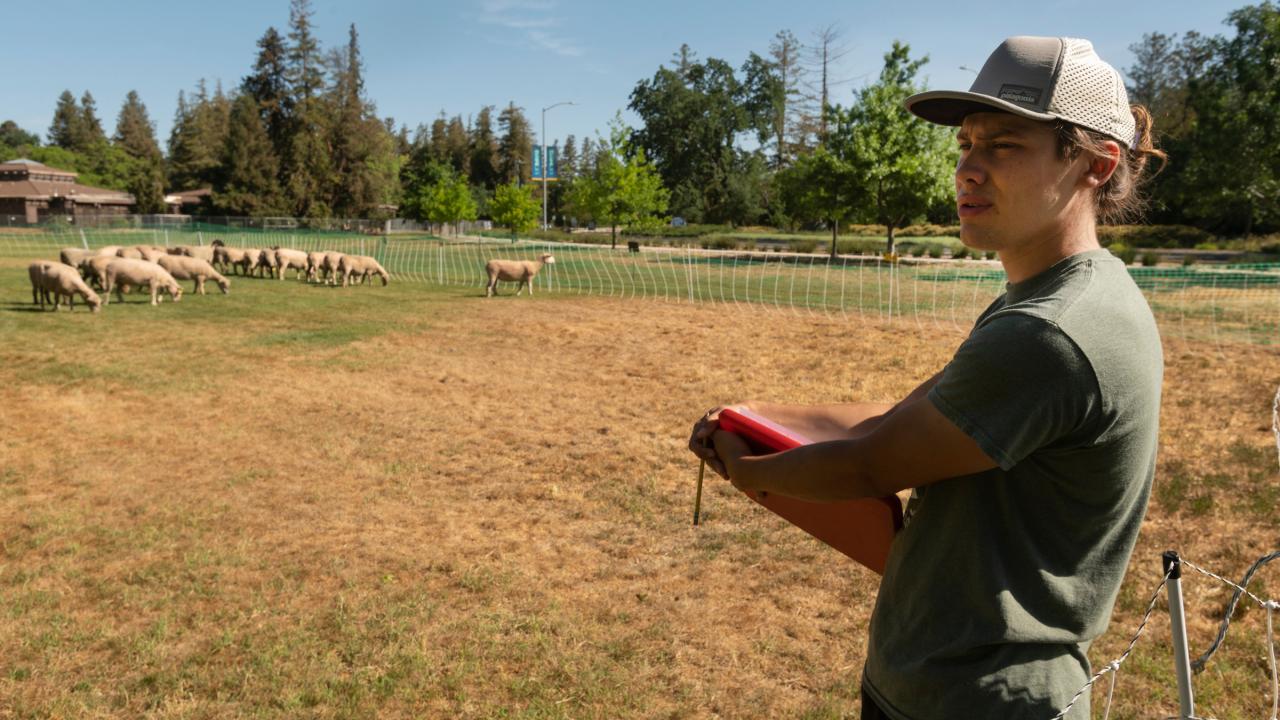
Nearly 40 percent of UC Davis undergraduates participate in hands-on research. On the occasion of the 28th annual Undergraduate Research, Scholarship and Creative Activities Conference on April 28 and 29 — where more than 700 students presented their work — we introduce you to some students and graduates who shared what they’ve gained. Consider how the research experience can benefit you, too.
1. Exploring career directions
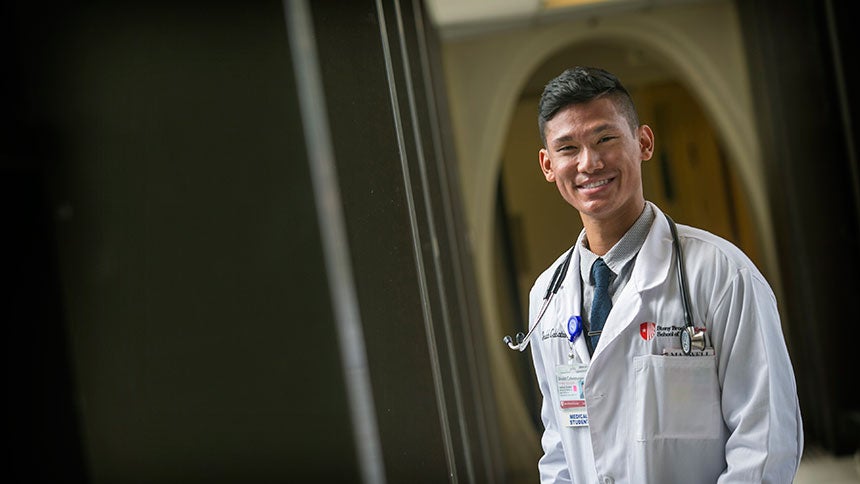
Here is how undergraduate research influenced the direction of three UC Davis students:
Shadd Cabalatungan started his studies at UC Davis aiming for a career as a veterinarian. Touched by his aunt’s diagnosis with breast cancer, he got involved with research at the UC Davis Comprehensive Cancer Center . That experience was key in changing his direction to pursue a medical degree. He also did research on how drinking by college students affects others who don’t drink. With a degree in sociology , he is now completing his first year as a medical student at Stony Brook University.
Graduating senior Rong Ben, once fascinated by the aesthetics of fashion, is geeking out on how technology can be incorporated so fashion helps solve problems. As a junior, this design major did a research internship with a professor working on wearable technology, including gloves to provide a patient’s vital statistics. “It opened up a new view for me,” said Ben. As a participant in the University Honors Program , Ben designed a grab-and-go coat for safety in an earthquake with protective materials, lighting, emergency food and water, and more. Next up for Ben: the graduate program in fashion enterprise and society at the University of Leeds.
Physics major Mario D’Andrea took a course related to climate neutrality to confirm his desire to study physics in graduate school. He worked with two other students to research waste reduction and carbon sequestration through composting. He enjoyed the research, and it helped confirm his desire to study condensed matter physics in graduate school. “I wish more classes were open-ended like this,” he said.
2. Building transferable skills and enhancing resumes
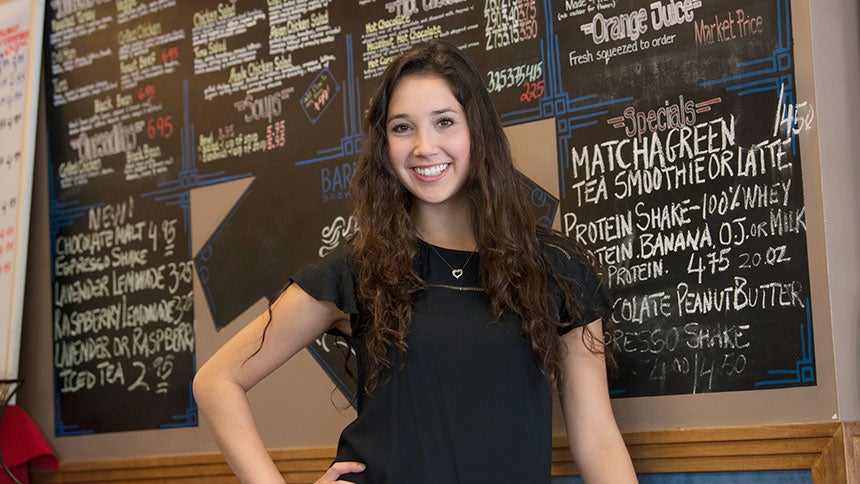
Graduating senior Julie Beppler has learned a lot about food options in downtown Davis. The managerial economics major analyzed how 49 restaurants use menu design to promote certain items. But more than that, she developed and demonstrated skills that employers seek. Beppler first worked as a research assistant and then pursued this project for her Undergraduate Honors Thesis . It focuses on the cost of production and price of featured menu items as well as their relative healthiness. She taught herself computer programing; learned time management; practiced professional communications as she interacted with restaurant managers; and proved her ability to motivate herself and direct her own work.
Beppler will soon start in the management development program at E. & J. Gallo Winery, so take her word that doing research can also help students find a mentor who can provide letters of recommendation and advice to support their success. Kristin Kiesel , a faculty member in agricultural and resource economics and a mentor to Beppler, agreed: “There is no better way to recommend a student than by having them successfully complete an undergraduate research project.”
3. Learning to publicly advocate for and defend work
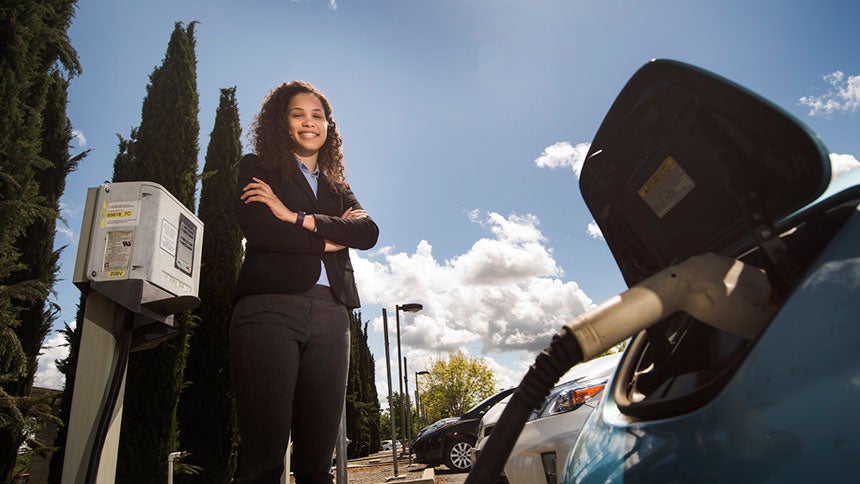
“Nerve wracking.” That’s how graduating senior Kathryn Green described her anticipation of presenting for the first time her research on California’s clean car consumer rebate program. Now she’s a UC undergraduate research ambassador. Last quarter, the political science major participated in the policy program at the UC Center Sacramento , which included classes, an internship with the advocacy organization Environment California and a research project.
Presenting the research was a requirement. Green designed a large poster representing her research and, in a session lasting 90 minutes, explained it one-on-one to attendees. She talked about the process and her policy recommendations not only to policymakers and people from the clean car industry, but also to others who were unfamiliar with the topic. “I became almost a teacher,” said Green. “I took my research and explained it to someone who didn’t know about it.”
Based on her success in that venue, Green represented UC Davis at showcase in Los Angeles earlier in April for alumni, donors, regents and other friends of the University of California. “I’m really proud I got to go down and share my research,” she said.
4. Getting a leg up on graduate or professional school
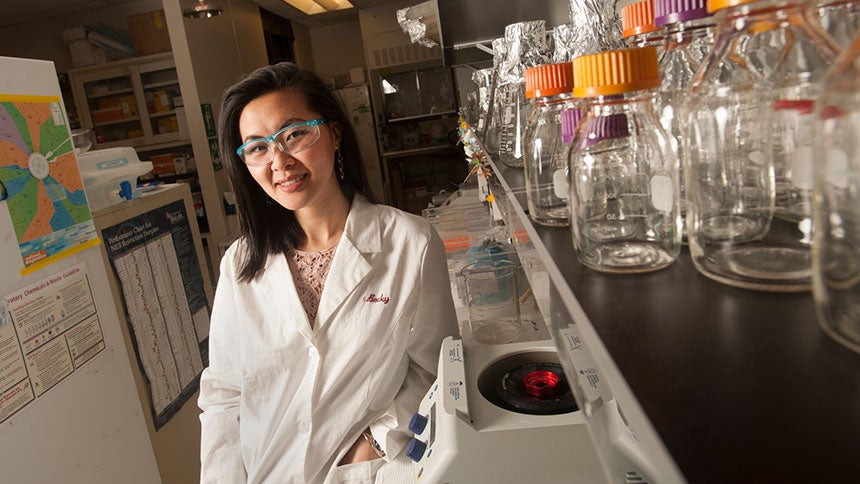
When Becky Fu came to UC Davis in 2008, she was the first in her family to attend college. Nine years later, this genetics and genomics major is preparing to defend her dissertation and graduate from Stanford University with a doctoral degree in genetics and a master’s degree in biomedical informatics. A 2012 graduate from UC Davis, she credits her participation in undergraduate research as foundational to where she is today. “No question about it,” she said. “Without undergraduate research, there would have been no way I got into any of the graduate programs I did.”
As a freshman, Fu heard others talking about research and sought out the Undergraduate Research Center on campus for more information. She went on to do research with two professors; participate in the undergraduate research conference ; publish in Explorations , the UC Davis journal of undergraduate research; be awarded a Provost’s Undergraduate Fellowship to help pay for her research; and win the Chancellor’s Award for Excellence in Undergraduate Research and other awards.
“Having that experience as an undergraduate to fail a lot and expand on the techniques,” Fu said, “was an integral part of being prepared for and getting through the doctoral program.” At Stanford, she is working in the lab of Andrew Fire, who shared the 2006 Nobel Prize for Physiology or Medicine .
5. Contributing knowledge and impacting the world
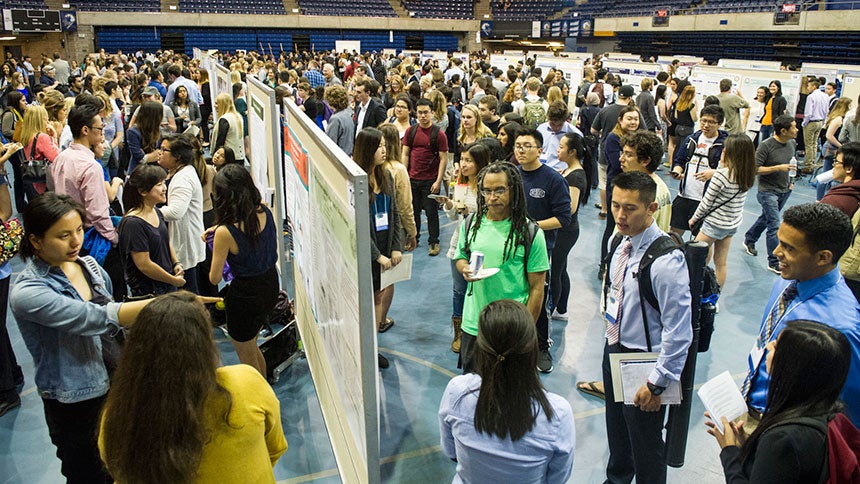
Annaliese Franz, associate professor of chemistry and faculty director of the Undergraduate Research Center , sees students experience the joy of discovery and creation through research. “Students really get the chance to create something new as they go into the lab or out into the field or study new policy.”
Fu, the Stanford student, explained how undergraduate research developed a new quest for her: “I wanted to be contributing to a bigger cause, a bigger realm of intelligence, and that’s advancing medical care in general.”
And Green, who did the research on the clean-car rebate program, discovered a new power. “My research told me that an undergraduate can make an impact,” she said. “You don’t have to have a master’s degree or doctorate to make valuable contributions.”
Julia Ann Easley of News and Media Relations supports communication and writes stories at the heart of the university. Her career includes a noble cause, adventures in learning, working with wonderful people and a beautiful green setting.
Subscribe to our majors blog
Primary Category

IMAGES
VIDEO